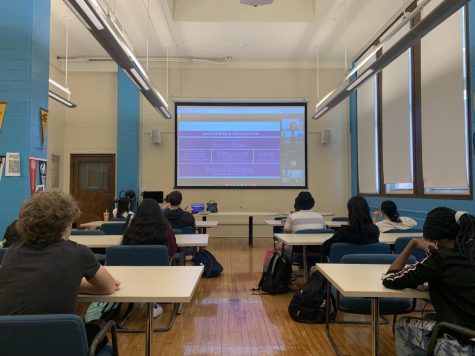Lane stays strong despite ‘nosediving’ budget
June 2, 2017
The recent CPS budget crisis has had everyone scrambling for answers. From the possibility of school ending early to court cases against the state, CPS is desperately trying to find money for the schools.
On Monday, May 15, Emanuel announced possible plans to get money for the schools. The week prior, he said he would to do “some very difficult things” according to the Chicago Sun-Times.
Emanuel said he is considering “new taxes on downtown businesses, ‘high net-worth individuals’ or both” to help CPS get out of the budget crisis, according to the Sun-Times.
The topic of the possible June 1 ending, instead of the usual June 20 ending, had parents, teachers and students very worried.
Although CEO Forrest Claypool was threatening this June 1 date, on April 28, Mayor Emanuel officially announced school would not be ending early.
“The kids of the City of Chicago will be in school until the end of the school year,” Emanuel said at the press conference. “That is where they belong.”
The reasoning for the shortened school year was the fact that CPS would have saved $91 million, along with another $5 million for cancelling summer school for all students, except those in high school, according to DNAinfo.
While this situation was taking place, CPS, still frantic for money, filed a court case against the state.
“The court case was brought by CPS against the state to say that the state does not fund education equally in Illinois — which pretty much everyone agrees upon, even the governor and the conservative members of the legislature — but there is huge disagreement as to how to fix it,” said Mrs. Trine, Lane Chemistry Teacher and Union Delegate.
CPS argued that since Chicago is primarily a minority district, not funding it equally breaks discrimination law.
CPS makes up 20 percent of the students in Illinois, but they only get 15 percent of money that the state spends on schools, according to Trine. “That 5 percent difference is millions and millions of dollars,” Trine said.
The court case was eventually shut down, leaving CPS still without money to fund the rest of the school year.
“The head of Chicago Public Schools was threatening this June 1st date to try and get the state, the governor, to chip in more money, and when he didn’t, and the court case didn’t succeed, then the city went ahead and found ways to pay for it themselves.” Trine said.
These ways may include TIF funds.
“They are going to need to borrow money from the TIFs, it looks like,” Trine said. T”IFs are tax increment financing, pools of money that in many people’s opinions, since that’s property tax money, that should just go right to the school, but there are some very weird, special rules that that money is shifted to the alderman.”
This money will be used as a bridge loan to CPS, but whether this money will be paid back or not is still unresolved, according to Trine.
Trine said what it all comes down to is paying for teacher pensions. Chicago is the only city in the state in which the city pays for the teacher pensions. Anywhere else the state pays for them.
CPS is not totally innocent, though. “One of the reasons the city has such huge pension payments right now is that back in the 90’s, when Mayor Daley took over Chicago Public Schools, his unelected school board, for 10 years running, made no payment into the pension fund,” Trine said. CPS is now suffering from 10 years of financial irresponsibility.
Since there is no money for the schools, in a sense the quality of some schools is going down, according to Trine.
CPS schools have not yet received the budget for the 2017 school year, leaving administrators worried about the consequences.
Last year Lane didn’t get their budget until the end of July, according to Ms. Hanly, assistant principal. Supposedly, CPS said schools would receive budgets earlier this year but know that school officials won’t be happy with what they get.
“We would rather be upset now and know what we are dealing with than to be figuring all of this out in July,” Hanly said.
Despite the “nose-diving budget,” Lane still does the things they need to do, according to Hanly. Lane continues to add more AP classes, get higher ACT scores, and a receive higher rank in U.S. News & World Report.
“It’s scary, but every year we have less money, and every year our rank goes up. So that’s a real testament to our teachers and kids,” Hanly said.






